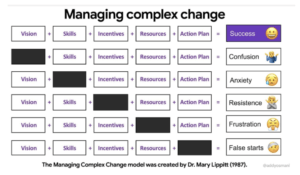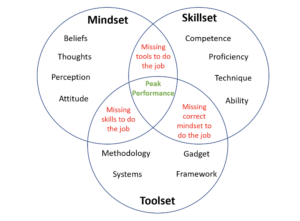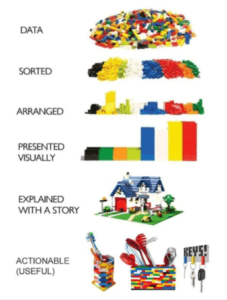At 2023’s BHBIA annual conference, held at the Hilton Hotel in Wembley, London between 12 – 13 June, Paul Dixey, an Independent Pharma Consultant and I ran an afternoon workshop session on ‘Ensuring Continuous Digital Transformation’.
We had attendees from different agencies as well as from Gilead, Sanofi, Boehringer Ingelheim and Novartis. Together we unpacked the topic and collaborated on a case study.
But what actually is digital transformation?
The Enterprisers Project defines it as follows:
“Digital transformation is the integration of digital technology into all areas of a business, fundamentally changing how you operate and deliver value to customers. It’s also a cultural change that requires organisations to continually challenge the status quo, experiment, and get comfortable with failure.”
We did spend some time considering the “get comfortable with failure” part, as this is something everyone embraces. Digital transformation is pioneering and trying new things out and failing sometimes is part of that journey. Paul made a humorous comment, saying that the pharmaceutical industry might have more pilots than British Airways! Yes, there is something true about that – we like to run a pilot, don’t we? It makes failing more comfortable in a way!
Did you know that most (75-90%) digital transformations fail?
Why do digital transformations fail?
- Over optimistic expectations – not a “Magic Wand”.
- Poor execution – lack of governance, technology over users, wrong metrics.
- Pace and managing change, from old to new – Mindset.
Summarising, you could say that digital transformations fail by going too big, too fast. There’s a learning curve to digital transformation, and most companies need to walk before they can run.
Harvard Business Review (HRB) describes three stages of a successful digital transformation:
- Modernization – is about simplifying and digitising existing processes and functions.
- Enterprise-wide transformation – is a complex cross-value-chain change effort.
- New business creation – increasing the size of the existing pie or creating new revenue lines.
In February 2022 I wrote a piece on Digital Opinion Leader engagement strategy and that a paradigm shift is needed. I would argue that this applies here too, but a paradigm shift doesn’t happen overnight and will require teamwork internally. Find those people within your organisation who are passionate about digital transformation. Learn from each other, fail together, and try something new.
Paul and I talked about this in our workshop and concluded that: Digital transformation is an organisational transformation.
How do you manage complex challenges?
So, how do you manage complex challenges? Paul explained the “Managing Complex Change model” which is an effective framework that can be used in any organisation to initiate change. The model was created by Dr. Mary Lippitt, a leadership and management consultant who specialises in helping organisations navigate through change:

Managing Complex Change encourages us to ask:
- What is your vision? Why is a change needed?
- What skills are needed? Does the team have expertise or training in what they are being asked to do? If not, will it be provided by someone they trust?
- What incentives are needed? How will it benefit the team? There is nothing worse than feeling as if time is being wasted on something that does not benefit them directly. Your team needs to understand how their work contributes directly to the success of an organisation and its mission statement.
- What resources are needed? A lack of resources leaves people frustrated. What resources are readily available? Are they appropriate? Are there in-house people who are resources that can assist with the implementation?
- What’s the action plan? What is the timeline? Who is responsible for what? How will progress be measured? What are the follow-up steps if there are problems?
This can be a powerful tool, and Paul encouraged our workshop attendees to especially look out for skills and resources.

He eluded further that often missing at the start of digital transformation is the need to address the mindset of individuals in combination with skill set and toolset. Before you implement any change, make sure you address all these aspects. If any aspect is missing, you’re in danger of preventing the individual from reaching peak performance.
If you only address the skill set and toolset – participants may only passively attend and find reasons why it won’t work for them.
If you only address the mindset and toolset – participants may miss the skills and competence needed to be effective.
If you only address the mindset and skill set – participants may not have access to tools needed to allow them to do their job effectively.
So, next time you start any initiative remember: MINDSET – SKILLSET – TOOLSET
Do we really need more data?
Our next big point on the workshop agenda was addressing the need for data and even more data. There seems to be a real hunger for data, and might I dare to say, people often experience an ‘overload’ of data? There is nothing wrong with collecting data. Once data is processed, information is created. Data can be any character, text, word, or number, but if it isn’t put into context it means little or nothing to a human.
There is a lot of ‘data dumping’ going on – we must move beyond data and information to actionable insights! Don’t be complacent, challenge your internal colleagues or your agencies who deliver on data. What is the story in there? What are the actions?

How to deliver digital transformation
Paul and I prepared beforehand a brief for our workshop attendees, so they could collaborate together. The scenario was a new CEO of a pharmaceutical company being appointed, and they observed that digital transformation hasn’t worked in the past. The CEO asked two questions:
- Why do you think this was?
- How can you help to deliver it in the future?
Here are some of the things that the group came up with:
Reasons why digital transformation isn’t working:
- Lack of skill set and resources.
- Mindset and culture not taken into account.
- Data all over the place (not clean).
- No clear measure of success.
- Averse to change.
- Building of digital strategy and organisational strategy separately.
- Internal silos, no collaboration and no communication, business units don’t understand their role.
- Lack of vision.
- No leadership support.
How to deliver digital transformation:
- Clear measures of success, a common goal.
- Change management – communication!
- Buy-in across the company, especially from the senior leadership team.
- Incentives: recognition and shared success.
- Strategic alignment.
- Proper preparation and planning.
- By saying yes to new things, say no to things that are not working.
- Access to subject-matter experts.
- Making it realistic and achievable.
What next?
Here are a couple of ideas that may help you with your digital transformation:
- Find like-minded people within the organisation, especially in the leadership team (find the champion!).
- Be clear and concise on what you want to achieve and what the outcomes will be. Golden rule: less is more (don’t overcomplicate!).
- Identify things (processes, tactics, workflows, etc.) that you need to stop doing in order to implement new ideas.
- When you talk internally about digital transformation, and you want to get people or your team to buy into it, try to avoid using the word ‘change’ as the primary response might be fear and anxiety. Let’s use words like modify/improve/correct/tweak. And highlight the things that won’t change, as this will give confidence and shows that not everything is changing!
- Failing is OK and part of the process of trying something new. Testing ideas is so important and by understanding what isn’t working you are much closer to understanding what actually is working!
- Have clear goals and DON’T GIVE UP – pioneering and transforming might not be an easy ride, and reminding yourself (even sometimes on a daily basis) of why you are on this journey will give you the motivation to keep going.
 By Anni Neumann
By Anni Neumann 
